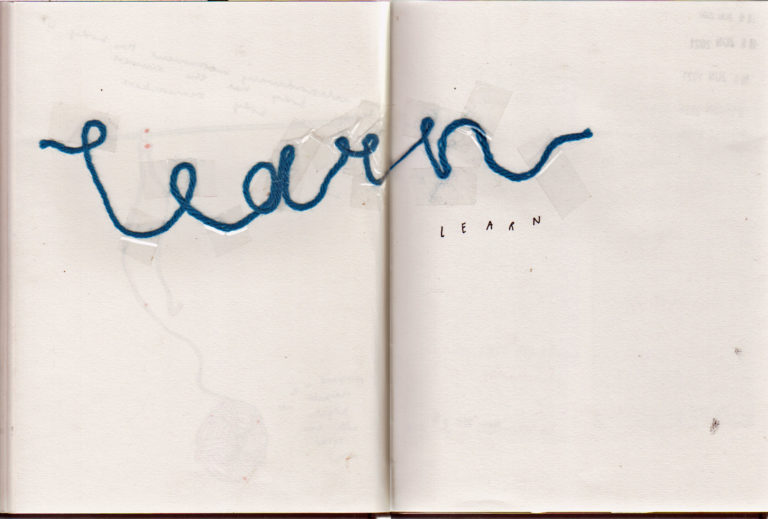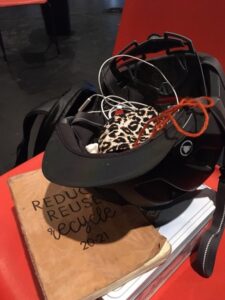Executive Director Ali Dunican reflects on using a period of r&d and open rehearsals to think about how we enact our environmental responsibility.

It’s difficult to pinpoint exactly when any of us individually became aware of climate change and our negative impact on our environment. Organisationally, for Quarantine, there has been an increasing awareness of this responsibility, but a chance conversation sharpened this focus and set us off in an irreversible direction…
Renny O’Shea and Richard Gregory, Quarantine’s co-Artistic Directors got chatting with Debbie Bell and Alison Criddle from HOME at a local cultural event in Manchester, back in 2018. Thankfully, both Debbie and Alison were evangelical about the work HOME was doing around sustainability, and it made an impression on us.
I had also attended the first ever MAST, now GMAST (Greater Manchester Arts Sustainability Team) meeting at Manchester Town Hall when I was working for the Green Room, then hosted by Julie’s Bicycle/Manchester City Council, and it was an area I was personally interested in.
A follow-up conversation between Quarantine and HOME took place. Our interest was piqued, and our commitment began to grow. It coincided with lockdown and some new-found capacity to, amongst other things, focus on our policy development and how to really enact our action plans.
As our staff champion in this area, Sarah Hunter (Artist/Producer), took the lead on reviewing our Sustainability Policy and Action Plan, and our team contributed thoughts and ideas. We also have a new Board member, Michelle Rocha, Head of Touring for Manchester International Festival, who will collaborate with Sarah and act as our board champion in this area.
We worked on our policy and action plan, and this included joining GMAST and engaging in dialogue in this area. Sarah and I took part in the Carbon Literacy training provided by The Carbon Literacy Trust in January 2021, supported by HOME, GMAST and funded by C-Change and delivered by the very committed Alison Criddle from HOME.
The training was instructive and enlightening, providing the momentum we needed to start acting. We completed the WWF Carbon Footprint checker, which highlighted grocery shopping as one of the biggest areas we could both address personally. Individually, we changed toilet roll supplier, slowly replaced our cleaning products, switched to more environmentally toiletries, stopped buying ‘fast fashion’, and signed up a regular for a fruit and veg box subscription.
For Quarantine, we made commitments to:
- Reduce single-use plastics in our shared working spaces
- Reduce our carbon emissions from business travel by 25% (by March 2023)
- Keep sustainability on our agenda (for staff and board)
- Become a member of and participate in GMAST, sign Manchester Climate Change Agency’s commitment to act, and get involved the wider cultural conversation around sustainability
We both agreed that our personal and organisational commitments in this area needed to work in parallel to support each other, i.e. that the more effort we put in personally, the more prescient and urgent this subject would be organisationally.
The Coronavirus pandemic accelerated some of our efforts in this area: working from home and restrictions on face-to-face delivery reduced travel; we gave up the lease on our city centre office which had come up for renewal; and we sold our diesel van.
Quarantine is an associate company at HOME, and HOME have co-commissioned our latest new work: 12 Last Songs, so we decided to use a period of r&d and open rehearsals in June/July 2021 as a case study to begin to think more deeply about how we can enact our environmental responsibility, including amplifying this message to those we work with and our audiences.
So, we set ourselves two targets during this r&d and open rehearsal period at HOME, namely: reducing/eliminating single-use plastic in the rehearsal/performance space, and recording how we travelled to and from work, to provide a benchmark for future targets.
Our aims were both to increase our and our wider team’s awareness and to test how easy or challenging this would be.
Reducing single use plastic: re-fillable water bottles and coffee cups; food packaging; and bring packed-lunches
Before the first rehearsal, we shared with our full team (17 in total for this part of the project) that we were planning to use this time as a test for focussing on these two areas – transport and reducing plastic. We asked people to bring in water bottles and reusable cups for their own use during this time. Most people did this, most of the time. Some told us that knowing other people were trying to do this helped them to do the same, and to be more prepared.
We also encouraged people to bring their own lunch from home, and we feel this was successful: setting expectations and peer pressure was very powerful!
If buying lunch locally, we asked people to consider how cafes and shops package their food; for example, Fairtrade bananas from Sainsbury’s Local come packaged in a non-recycled or recyclable plastic packaging, whereas non-Fairtrade bananas come loose – sometimes it’s about making choices.
We made sure there was access to freshwater to refill bottles, and to washing up facilities for cups and lunch boxes. We also provided a fridge, kettle, tea-making facilities (including plastic-free biodegradable tea bags), microwave, etc. We recognise that these facilities are not always available in each setting, but if we’re asking people to be mindful, we need to provide or facilitate the means. For Covid reasons, the snacks we provided had to be individually wrapped. So, while we did provide individually wrapped biscuits, we also looked for snacks with ‘natural packaging’, such as bananas and satsumas.
Plastic: and Covid-secure measures
We did buy and use some plastic half-visor masks for our team and visitors. These were washable and re-usable, with most of our team only having one or two units for the duration.
 Travel: recording our methods of travel
Travel: recording our methods of travel
We set up a signing in/out book where people recorded how they travelled to and from work each day. We were keeping our own Test & Trace record at this moment in time, so adding an extra column was easy.
Being asked to record their method of travel every day, made people more aware of the choices they were making and did seem to influence their decisions.
We also asked this of other people who visited the space during this time.
In the main, when people drove, it was for reasons of access, affordability, and convenience, including having to bring in large items that were needed or dropping children off at school on the way, etc. Members of the team who lived in the same area regularly car-pooled to work rather than making multiple individual journeys.
Two members of our team weren’t based in Manchester, and so were staying in accommodation we provided for the period of rehearsals. We chose to accommodate them as close to the city centre as possible, so that they could walk or cycle to work. This was for access and environmental reasons, and we made this commitment knowing that it would cost us more.
In summary, across 3 weeks, there were 183 journeys, and of these, 36% were either on foot or by bike, 34% were by car, and the remaining 30% of journeys were by public transport (bus, train, tram).
Full breakdown:
62 by car (car/car-pool/lift/uber/taxi/van) 34%
35 walked 19%
31 by bike 17%
20 by bus 11%
21 by tram 11%
14 by train 8%
Of our methods of transport during this period, walking, cycling, or travelling by train have the least negative carbon impact on the environment. After that, trams, then buses, then (petrol) cars with 2 passengers, then cars with single passengers, then black taxis and then (diesel) vans.
As well as focussing on transport and single-use plastic, there were other impacts we tried to consider. We produced a small number of printed fliers as recruitment materials, and chose a local supplier, Marc the printers, who use recycled paper. We also printed a small number of information sheets to give to our test audiences, but only printed the number we expected to use. We made use of recycling facilities at HOME but also brought our own general recycling bin and compost bin into the rehearsal room.
When considering what we needed to put in the rehearsal room in terms of set, we were mostly able to re-use items we already had in storage. For Quarantine, this is both an environmental and aesthetic choice to use items from a previous show in a new production. Our designer/scenographer, Simon Banham, and production manager, Greg Akehurst, decided to use our signature orange chairs, plus some wooden trestle tables, and we built some wooden flats. We’d previously made the same wooden flats for Wallflower and used them in in two other productions, but they had degraded in storage. We know these new ones will feature in other work in the future too. We’re looking at better storage solutions too, although finding suitable, affordable, water-tight storage facilities in the right location is a huge challenge.
In terms of lighting, we bought some portable LED lights on stands, and our LX Designer worked up a plan which also uses whatever lanterns are already in the space (grid or no grid, so the work can tour to performance spaces and non-performance spaces alike).
There are a couple of obvious areas where we need to find better solutions. One of our key targets is to stop using Amazon Prime to order items. We use Amazon out of habit, for speed, price, and availability, but we don’t always get the best quality or most ethically sourced products, and we’re contributing to the issues caused by excess packaging and increased fossil fuel use from deliveries. It is in our action plan to research alternative suppliers for items that we regularly order/use, including local and independent suppliers, who we’d like to support more.
We premiered 12 Last Songs at Leeds Playhouse as part of Transform festival in October 2021, and we used that opportunity to continue this gentle investigation. We’ll share more about that in Chapter #2.
Ali Dunican.